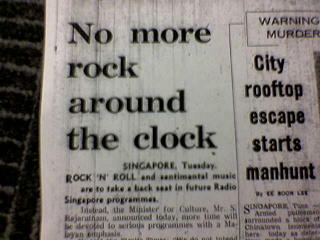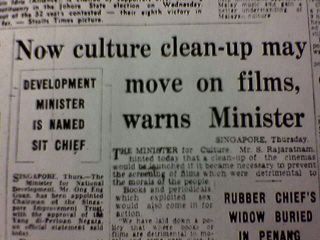- MM Lee Kuan Yew, Apr 17, 2005
It all began in 1959...
As part of my own commemoration of Singapore's upcoming 40th birthday, here is a series of historical snapshots from the Straits Times and The Singapore Standard.
Before independence in 1965, Singapore had been granted self-governance by the British.
On June 9, 1959, barely 10 days after being voted into public office, the new PAP administration initiated a clampdown on rock music, jukeboxes, publications, strip tease shows (yes, we used to have that!), films and all popular entertainment that were deemed as "yellow culture" contributing to "the decline in the moral standards of society."

The Straits Times, June 10 1959 (Page 1 headlines)
RADIO: THE NEW ORDER
More serious programmes - with emphasis on Malaya
No more rock around the clock
Singapore, Tuesday
ROCK N' ROLL and sentimental music are to take a back seat in future Radio Singapore programmes.
Instead, the Minister of Culture, Mr. S. Rajaratnam, announced today, more time will be devoted to serious programmes with a Malayan emphasis.
He told the Straits Times: "We do not intend to ban rock n' roll and other light music. We feel, however, that there is too much of it at present.
"We aim to achieve a more even balance.
"The new policy will apply to vernacular as well as English programmes. It will govern the selection of recorded programmes supplied by overseas broadcasting companies and corporations.
"News commentaries and reviews will be compiled first from the Malayan and then the Asian point of view.
"We want listeners to think as Malayans. It is no use looking at Asian affairs through Western eyes.
First choice
"Wherever possible, local men will be given priority in commenting on the news, though this does not mean that foreign commentators will be excluded altogether."
Mr Rajaratnam said he and officials of his Ministry were deciding how the broadcasting and information departments could be co-ordinated.
He said he might go to Kuala Lumpur for talks with Radio Malaya authorities. No date had been fixed for these talks yet, he added.
June 9 1959, The Singapore Standard 
SINGAPORE'S Minister for Home Affairs, Mr. Ong Pang Boon, yesterday banned eight publications and withdrew the licence of the Mei Hua (Plum Blossom) Stage Show, which was playing at the Great World Amusement Park.
The Minister decided on the ban after consultation with Prime Minister Mr. Lee Kuan Yew and Senior Police officials yesterday morning.
The publications banned are: The Weekender (Free Press), the Free Press, Weekender Annual, the Nanyang Weekender, Arrow News, Kung Sang Pau, New Life News, Ti Press and the Fan Hua Pao.
Mr. Ong, in a written statement clarifying his decision to ban the stage show and the eight publications, said that it was part of "an active policy of eliminating all pornographic culture and all activities which are detrimental to the growth of a new and healthy society and culture."
He pointed out that under "colonial rule" Singapore had not only been exploited economically and politically but had also been culturally devastated.
Moral decline
"There has been a steady decline in the moral standards of society, particularly in the post-war decade, during which the degeneration has been very great," he said.
He pointed out that Singapore's young boys and girls "rock n' rolled" in the streets while its young wasted their time playing billiards and listening to sexy songs; striptease shows were performed freely and publicly.
"The continued development of such a situation will eventually lead to the total bankruptcy of the moral standards of our society," he said.
Mr. Ong said that the PAP told the people before it came into power that it would eliminate all the factors which contributed to the decline of moral standards of society and which stood in the way of the creation of both healthy social standards and of a healthy culture.

Straits Times, June 12 1959 (page 9)

The Minister for Culture, Mr. S. Rajaratnam, hinted today that a clean-up of the cinemas would be launched if it became necessary to prevent the screening of films which were detrimental to the morals of the people.
Books and periodicals which exploited sex would also come in for action.
"We have laid down a policy that where books or films are detrimental to morals and come very close to being classified as "yellow culture", it follows logically that they will be banned," he said.
"The film censorship policy will reflect this new attitude."
He said any action taken would be done in consultation with the Minister for Home Affairs, Mr. Ong Pang Boon, who deals with film censorship.
Pin-tables
Besides juke boxes, against which the Government is expected to take action, pin-tables are also likely to come in for similar action.
These are found in coffee shops and amusement parks. In some places they are the haunts of hooligans and gangsters.
The newly-appointed Parliamentary Secretary to the Minister for Culture, Mr. Lee Khoon Choy, today moved into his office adjoining that of Mr. S. Rajaratnam in the Department of Information Services.
The Minister and the Information Services expect to move into new offices in City Hall in about a fortnight.

No comments:
Post a Comment